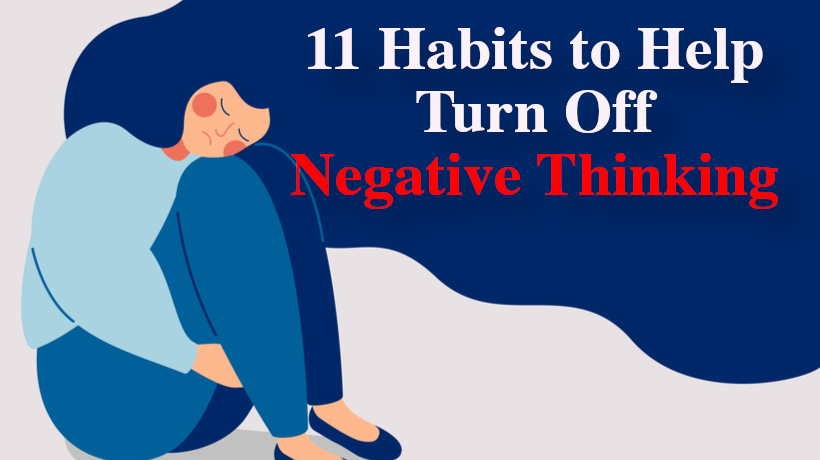We are all different in how we deal with stress and can easily default to negative thinking when worried and uncertain. What causes negative thinking? When you are triggered by exhaustion, stress, hunger, sleep deprivation, the common cold, illness, or allergies, any of these can shift you into depression, which leads to negative thoughts. Your emotional reactions can reinforce negative thinking.
Here are 11 habits you can choose from to help turn off negative thinking and move towards realistic or optimistic thoughts.
- Recognize a negative thought. Practice becoming aware of when these thoughts come up. Notice if you are tired, hungry, disappointed, stressed, or something else. Ignoring negative thoughts won’t help them disappear. Instead, they can get more intense. Pay attention and say to yourself, “I’m recognizing a negative thought; it’s a story I’m telling myself, and it’s not true.” This puts it away quickly, so it doesn’t keep recurring.
- Confront your negative thinking when you find yourself blowing it out of proportion. Stop a negative thought from becoming a big monster in your mind by confronting it early. Use a self-question that brings you back to balance. Look at the longer view by asking yourself, “Will this matter in 5 years? Will this matter in 5 weeks?”
- Expect and accept occasional let-downs. Expecting everything to be perfect sets you up for disappointment. Make sure your expectations and vision of success is steeped in reality. For instance, if that exciting trip you’ve anticipated must be postponed for a year, does this really change anything in the long run? Having the perspective of adapting when necessary can help you feel free to live on your own terms.
- Balance your thoughts by identifying what’s good. If you’ve had a setback, a stumble, or a failure it’s reasonable to experience negative thinking. Things might look bleak, and your negative thoughts may threaten to consider only the problems. By asking yourself non-judgmental questions that prompt a more balanced look at the situation, you see that one small misstep doesn’t mean that everything went wrong. This will provide you with a reality check that grounds you in your perspective and counteract the negative thoughts with learning, resilience, and growth. Try self-questions such as:
What’s one good thing about this situation?
What’s one thing I can do differently the next time to likely have a better outcome?
What’s one thing I can learn from this?
How would my best friend support and advise me in this situation? - Shake off the idea that people are judging what you say or do. Getting stuck in your head with worry about how people are judging you can lead to negative thoughts. Frankly, people are too busy to pay that kind of attention to what you say or do. They have their own concerns. By letting this go, you will feel freer from these concerns and help you take more control of your purpose, values, and boundaries.
- Go for a short workout. Sometimes going out for a walk – especially in nature, or a 20-minute workout can release any inner tension and calm your thoughts and concerns. And it shifts your focus to be constructive once again.
- Talk about your negative thought with a trusted friend. If you sit with negative thoughts for too long, it won’t help you to find a healthy balance. Instead, let them out by talking through your situation or concerns with someone you trust. In just a few minutes, it can move you to a new point of view. You may see a way forward that brings you hope, a more realistic perspective, and charge up your energy.
- Focus only on breathing. Breathing brings you more ease and self-awareness. Take a 1 to 2-minute pause right away and concentrate on deeper and slower breaths than usual. Breathe into your stomach and through your nose. Focus only on the air going in and out – nothing else. Breathing can stop negative thoughts, judging yourself, and regain your balance. Practice makes habits!
- Replace the negative thought with an activity. It’s impossible to stop thoughts, but if you replace them with an enjoyable activity, it might replace negative thinking for an hour or so. By picking something you love to do and work on it, you may reduce the power of the negative thought. Afterward, you are calmer and can ask yourself some questions to break the pattern.
- Bring something positive and of service into someone else’s life. When you are stuck in your negative thoughts, one of the best ways to get out of your own head is to focus outwards and on someone else. You will start to regain optimism when you attend to another person’s needs. By listening to them, being of some service, and adding some positivity to their life in some way, you gain satisfaction. Two ways to add positivity to someone’s life is to:
Listen actively with empathy. Listen carefully and validate their feelings.
Be kind by helping out. If requested by the other person, provide some excellent advice, make and deliver a meal, or help plan something. - Be grateful for a few of the things you may often take for granted. Appreciation is a powerful tool for finding balance and turning off negative thinking. When you go negative, it’s easy to forget the positive things you can be grateful for. For example, “I have a loving family. I live in a safe place. I have kind and helpful friends.”
Disclaimer: The article is the opinion of the author.



